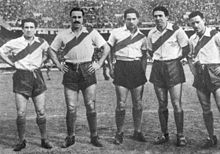Félix Loustau
| Félix Loustau | ||
 Loustau in the jersey of River Plate
|
||
| Personnel | ||
|---|---|---|
| Surname | Félix Loustau | |
| birthday | December 25, 1922 | |
| place of birth | Avellaneda , Argentina | |
| date of death | January 5, 2003 | |
| Place of death | Buenos Aires , Argentina | |
| position | striker | |
| Juniors | ||
| Years | station | |
| CA Defensores de Belgrano | ||
| Sportivo Brandsen | ||
| Racing Club | ||
| Sportivo Dock Sud | ||
| Men's | ||
| Years | station | Games (goals) 1 |
| 1942-1957 | River Plate | 365 (101) |
| 1957-1958 | Estudiantes de La Plata | ? (?) |
| National team | ||
| Years | selection | Games (goals) |
| 1945–1952 | Argentina | 28 (10) |
| 1 Only league games are given. | ||
Félix Loustau (born December 25, 1922 in Avellaneda , Buenos Aires Province , † January 5, 2003 in Buenos Aires ) was an Argentine national football player. He won the Copa America three times with the Argentine national soccer team . At club level, he was part of the legendary Máquina , one of the most outstanding club formations in football history, at CA River Plate , and won numerous championships with the club.
Loustau was known for his speed and dribbling strength. Because of his external appearance and his idiosyncratic style when dribbling, he was nicknamed "Chaplin" (→ Charles Chaplin ). The left-footed striker played precise passes and had a well-placed shot. Even today he is widely regarded as the best left winger in Argentine football history.
career
In his youth, Loustau made his first footballing attempts at the local clubs CA Defensores de Belgrano and Sportivo Brandsen , before he joined the Racing Club , also in his home district of Avellaneda. While still on the Racing youth team, he caught the attention of River Plate as a 17-year-old . To avoid a direct trade between the two big clubs, Loustau played twice for Sportivo Dock Sud before he joined the Millonarios , as River is also called, and where he was to celebrate great successes over 15 years.
While he was still on the defensive at Racing, his talent as a striker was quickly recognized at River. He made his debut with the fighting team on June 28, 1942 at the Estadio Monumental in the game against Platense and was to celebrate his first championship with River that same year.
He soon developed alongside Adolfo Pedernera , José Manuel Moreno , Angel Labruna and Juan Carlos Muñoz to become part of the Máquina , the machine, as the exceptionally strong team of River Plate, which dominated Argentine football in those years, was called. Seven more championships were to follow by 1957. Loustau contributed to this with a total of 101 goals in 365 games.
After the championship in 1957, Loustau moved again briefly to Estudiantes de La Plata , where he ended his playing career in 1958 at the age of 35.
National team
In 1945 Félix Loustau was appointed to the Argentine national team for the first time. In the same year he won the Campeonato Sudamericano with the Albiceleste in Santiago de Chile in 1945 . He gained a lot of sympathy when he shouldered his opponent, who was injured after a duel, and carried it to the line. At the time, this earned him great applause from the audience.
In the following two years he defended his title with Argentina at the tournaments in Buenos Aires and Guayaquil, Ecuador . In total, Loustau appeared 27 times for Argentina until 1952, scoring 10 goals.
Later years
Following his playing career, he worked as a coach and became a professor at the coaching school of the Argentine Football Association .
On January 5, 2003, Félix "Chaplin" Loustau died as the penultimate survivor of the legendary Máquina in Buenos Aires at the age of 80 as a result of heart and lung failure. He was buried in the Avellaneda cemetery, the Cementerio de Avellaneda.
successes
- Copa América : 1945, 1946, 1947
- Championship of Argentina : (8 ×) 1942, 1945, 1947, 1952, 1953, 1955, 1956, 1957
Web links
- Futbolfactory: Félix Loustau ( Memento from October 20, 2007 in the Internet Archive )
- Clarin: "El adios a un grande integrante de la famosa maquina riverplatense"
- La Nacion: "Fallció el legendario Félix Loustau"
Individual evidence
| personal data | |
|---|---|
| SURNAME | Loustau, Felix |
| BRIEF DESCRIPTION | Argentinian soccer player and coach |
| DATE OF BIRTH | December 25, 1922 |
| PLACE OF BIRTH | Partido Avellaneda , Argentina |
| DATE OF DEATH | January 5, 2003 |
| Place of death | Buenos Aires , Argentina |
